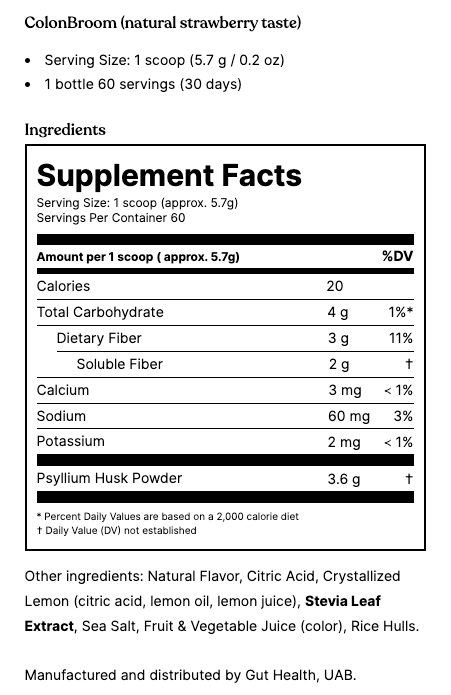References
References for All Products Revied on VitalityRecap.com
Colon Broom
Relieve constipation
- Erdogan, A., Rao, S.S.C., Thiruvaiyaru, D., Lee, Y.Y., Coss Adame, E., Valestin, J. and O’Banion, M. (2016) Randomised clinical trial: mixed soluble/insoluble fibre vs. psyllium for chronic constipation. Alimentary Pharmacology & Therapeutics, 44(1), pp.35–44. doi:https://doi.org/10.1111/apt.13647
- Jalanka, J., Major, G., Murray, K., Singh, G., Nowak, A., Kurtz, C., Silos-Santiago, I., Johnston, J., de Vos, W. and Spiller, R. (2019) The Effect of Psyllium Husk on Intestinal Microbiota in Constipated Patients and Healthy Controls. International Journal of Molecular Sciences, 20(2), p.433. doi:https://doi.org/10.3390/ijms20020433
- Alice van der Schoot, A., Drysdale, C., Whelan, K. and Dimidi, E. (2022) The effect of fiber supplementation on chronic constipation in adults: an updated systematic review and meta-analysis of randomized controlled trials. The American Journal of Clinical Nutrition, 116(4). doi:https://doi.org/10.1093/ajcn/nqac184
- Jalanka, J., Major, G., Murray, K., Singh, G., Nowak, A., Kurtz, C., Silos-Santiago, I., Johnston, J., de Vos, W. and Spiller, R. (2019) The Effect of Psyllium Husk on Intestinal Microbiota in Constipated Patients and Healthy Controls. International Journal of Molecular Sciences, 20(2), p.433. doi:https://doi.org/10.3390/ijms20020433
Weight management
- Pal, S., Ho, S., Gahler, R.J. and Wood, S. (2016) Effect on body weight and composition in overweight/obese Australian adults over 12 months consumption of two different types of fibre supplementation in a randomized trial. Nutrition & Metabolism, 13(1). doi:https://doi.org/10.1186/s12986-016-0141-7
- Pal, S., Khossousi, A., Binns, C., Dhaliwal, S. and Ellis, V. (2010) The effect of a fibre supplement compared to a healthy diet on body composition, lipids, glucose, insulin and other metabolic syndrome risk factors in overweight and obese individuals. British Journal of Nutrition, 105(01), pp.90–100. doi:https://doi.org/10.1017/s0007114510003132
- Thompson, S.V., Hannon, B.A., An, R. and Holscher, H.D. (2017). Effects of isolated soluble fiber supplementation on body weight, glycemia, and insulinemia in adults with overweight and obesity: a systematic review and meta-analysis of randomized controlled trials. The American Journal of Clinical Nutrition, 106(6), pp.1514–1528. doi:https://doi.org/10.3945/ajcn.117.163246
- Howarth, N.C., Saltzman, E. and Roberts, S.B. (2009) Dietary Fiber and Weight Regulation. Nutrition Reviews, 59(5), pp.129–139. doi:https://doi.org/10.1111/j.1753-4887.2001.tb07001.x
- McRorie, J.W., Gibb, R.D., Sloan, K.J. and McKeown, N.M. (2021) Psyllium: The Gel-Forming Nonfermented Isolated Fiber That Delivers Multiple Fiber-Related Health Benefits. Nutrition Today, 56(4), pp.169–182. doi:https://doi.org/10.1097/nt.0000000000000489
Bloating
- McRorie, J.W., Gibb, R.D., Sloan, K.J. and McKeown, N.M. (2021) Psyllium: The Gel-Forming Nonfermented Isolated Fiber That Delivers Multiple Fiber-Related Health Benefits. Nutrition Today, 56(4), pp.169–182. doi:https://doi.org/10.1097/nt.0000000000000489
- Alice van der Schoot, A., Drysdale, C., Whelan, K. and Dimidi, E. (2022 The effect of fiber supplementation on chronic constipation in adults: an updated systematic review and meta-analysis of randomized controlled trials. The American Journal of Clinical Nutrition, 116(4). doi:https://doi.org/10.1093/ajcn/nqac184
Promotes gut health
- Jalanka, J., Major, G., Murray, K., Singh, G., Nowak, A., Kurtz, C., Silos-Santiago, I., Johnston, J., de Vos, W. and Spiller, R. (2019). The Effect of Psyllium Husk on Intestinal Microbiota in Constipated Patients and Healthy Controls. International Journal of Molecular Sciences, 20(2), p.433. doi:https://doi.org/10.3390/ijms20020433
- La Torre, D., Verbeke, K. and Dalile, B. (2021) Dietary Fibre and the Gut-Brain Axis: Microbiota-Dependent and Independent Mechanisms of Action. Gut Microbiome, pp.1–39. doi:https://doi.org/10.1017/gmb.2021.3
- Kaczmarczyk, M.M., Miller, M.J. and Freund, G.G. (2012) The health benefits of dietary fiber: Beyond the usual suspects of type 2 diabetes mellitus, cardiovascular disease and colon cancer. Metabolism, 61(8), pp.1058–1066. doi:https://doi.org/10.1016/j.metabol.2012.01.017
- Anderson, J.W., Baird, P., Davis Jr, R.H., Ferreri, S., Knudtson, M., Koraym, A., Waters, V. and Williams, C.L. (2009) Health benefits of dietary fiber. Nutrition Reviews, [online] 67(4), pp.188–205. doi:https://doi.org/10.1111/j.1753-4887.2009.00189.x
- McRorie, J.W., Gibb, R.D., Sloan, K.J. and McKeown, N.M. (2021) Psyllium. Nutrition Today, 56(4), pp.169–182. doi:https://doi.org/10.1097/nt.0000000000000489
Weight loss prediction
The weight loss prediction provided in the website is designed and adapted based on the Body Weight Planner, a service offered by the National Institute of Diabetes and Digestive and Kidney Diseases (NIDDK), which is a part of the National Institutes of Health (NIH). The prediction takes into account personal anthropometric characteristics and tailors the weight loss estimation based on a calorie deficit diet and an increase in physical activity. While the weight loss prediction aims to provide an estimate of potential weight loss based on the inputs and assumptions used in the Body Weight Planner, it is important to note that the prediction is intended for informational purposes only and should not be considered as a definitive guarantee of actual weight loss outcomes. By using the weight loss prediction provided, you acknowledge that it is not a substitute for professional medical advice, diagnosis, or treatment.
Product Label

